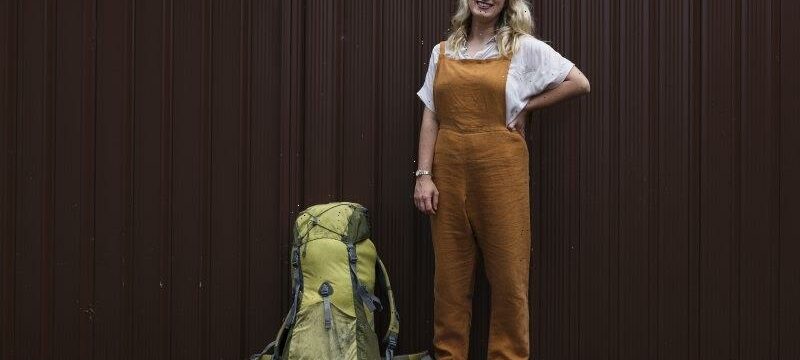For our free coronavirus pandemic coverage, learn more here.
Millions of Australians are preparing to travel next year in the hope of heading to destinations like Asia and Europe, with 38 per cent of adults saying they want to head overseas if the conditions allow them to cross borders.
The exclusive survey, conducted for The Sydney Morning Herald and The Age by research company Resolve Strategic, shows the steady fall in border controls has also revived confidence in tourism within Australia to the point where 59 per cent of respondents say they are likely to travel interstate in the year ahead.
Caitlin Robson is excited to travel next year now borders are open.Credit:Brook Mitchell
But concerns about lockdowns are the greatest barrier to the plans, with 44 per cent of those who are unlikely to travel saying they are worried about being trapped away from home.
The findings suggest concerns about lockdowns are greater than fears of catching COVID-19 when people consider a holiday, with only 24 per cent of the same group naming this as the reason they were unlikely to travel.
Caitlin Robson, who lives in Sydney’s inner west, is among the Australians hoping to head overseas next year.
Her plans to move to the United Kingdom, considered a rite of passage among many young people, were put on hold when the COVID-19 pandemic hit. Now borders have reopened, the 26-year-old is getting ready to pack her life up and travel to the UK in June next year.
“People have certainly turned a corner in terms of living with COVID,” she said.
“You can’t be scared of it any more like we were last year. Among my friends, people’s plans are starting to emerge and I definitely don’t think there is a sentiment of fear, there’s just a sentiment of dealing with it.”
The survey shows only 14 per cent of all respondents are likely to travel overseas in this coming holiday period, while 86 per cent are unlikely.
The result changes to 38 per cent being likely and 62 per cent unlikely to travel overseas when asked about plans for 2022.
Tim Rawling, 29, who lives in South Yarra, is planning a trip to Japan for four weeks from January 8 next year. His last international trip was to the US in mid-February 2020.
The Victorian said he was “somewhat concerned” if the situation changed and quarantine was introduced.
“But otherwise I’m just excited,” he said. “I didn’t get to go skiing at all in Australia throughout the last year, so I’m excited for that as well.
“Just to get out of Australia. Just to have something a bit different. It’s just excitement. It’s a feeling of being – for lack of a better word – free again.”
Tim Rawling and Ashleigh Gillman are looking forward to their trip to Japan early next year.Credit:Joe Armao
Mr Rawling added if quarantine was introduced he would probably cancel the trip.
The Resolve Political Monitor surveyed 1606 people over six days to November 21 with a margin of error of 2.5 per cent for the results from the full survey group.
When those who are likely to travel overseas were asked where they wanted to go, 39 per cent named Asia while 36 per cent named Europe and 34 per cent named New Zealand the Pacific Islands.
On this question, which allowed people to nominate multiple destinations, 17 per cent named the United States, 5 per cent named Africa and 4 per cent named South America.
The sweeping federal ban on people leaving Australia ended on November 1 after more than 18 months of emergency restrictions that were imposed by federal cabinet without a vote in Parliament, but unvaccinated citizens and permanent residents must continue to apply for exemptions to leave.
The federal vaccine certificate, which can be downloaded from the myGov website, allows people to gain an international vaccine record they can show when travelling.
State restrictions continue to prevent Australians crossing internal borders, with the Queensland government website defining all of Victoria, NSW and the Australian Capital Territory as hotspots.
Western Australia considers visitors from NSW to be high risk and requires them to apply for a border permit and undergo 14 days of self-quarantine, while visitors from Victoria are considered extreme risk and must do 14 days of hotel quarantine.
Asked if they expected to travel interstate in this coming summer holiday, 36 per cent of respondents said they were likely to do so while 64 per cent said they were unlikely.
That changed when people were asked about the year ahead, with 59 per cent likely to travel interstate during 2022 but 41 per cent unlikely to do so.
Stay across the most crucial developments related to the pandemic with the Coronavirus Update. Sign up to receive the weekly newsletter.
Most Viewed in Politics
From our partners
Source: Read Full Article


